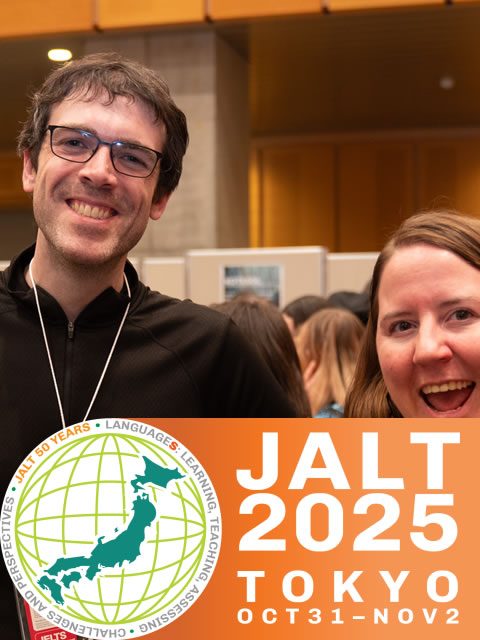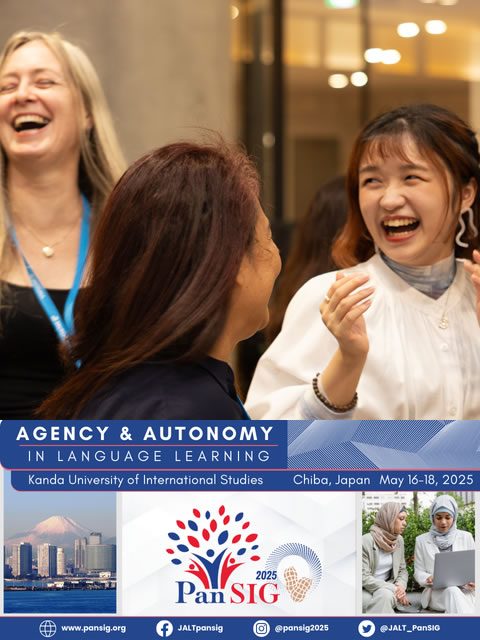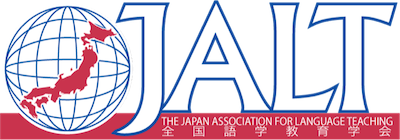Your cart is currently empty!
Featured Speakers
•
The Featured Speakers for JALT2013 are:
Charles Browne (Sponsored by Cambridge University Press )
Christine Pearson Casanave (Sponsored by CUE SIG)
Crayton Walker (Sponsored by University of Birmingham)
Curtis Kelly (Sponsored by Nova Southeastern University)
Daniela Papi (Sponsored by GILE SIG )
David Harrington (Sponsored by Language Solutions Japan)
Elka Todeva (Sponsored by Osaka JALT/School for International Training)
Grant Trew (Sponsored by Oxford University Press)
Scott Thornbury (Sponsored by Kobe JALT/The New School)
Rubina Khan (Sponsored by The Balsamo Asian Scholar)
JALT2013 Plenary and Featured Speaker articles from the July/August edition of The Language Teacher (Vol. 37, No. 4) are available in PDF format. Use this link to download the PDF from the JALT Publications website.
Charles Browne
Building Essential Vocabulary with Online Tools
Sponsor: Cambridge University Press
Although there has been great progress in the last 30 years since Paul Meara declared vocabulary to be the most neglected aspect of language learning, limited class time and other logistical factors have kept most teachers from being able to systematically tackle the teaching of important high frequency vocabulary words. Fortunately there is a rich and wide array of free and paid online resources for computers, smartphones and tablets which can help teachers, learners and researchers to do much more in this area. This presentation will introduce and demonstrate several of the most useful sites (with most of the focus on the free ones!), and give participants a much longer annotated list of sites they can take home to try out at their leisure. The last few minutes of the session will be devoted to Q&A, comments, and the chance for participants to talk about their own useful vocabulary resources.
Charles Browne is Professor of Applied Linguistics and head of EFL teacher-training at Meiji Gakuin University. He is a specialist in second language vocabulary acquisition, and reading skills development and deeply active in the area of online-learning, helping to create research-based language learning software such as EnglishCentral, goFluent, WordEngine, the GSL and AWL Builder iPhone apps as well as a wide suite of free extensive-reading tools and content at his http://www.er-central.com site. He is co-author of the New General Service List, which is based on a 273 million word sample of the Cambridge English Corpus, the sponsor of his presentation.
Christine Pearson Casanave
Ecology of Effort: Motivation and Investment
Sponsor: CUE SIG
This workshop explores the notion of “ecology of effort” and its connection to more traditional concepts of motivation and attitude. By “ecology of effort” I mean the many interrelated environmental, physical-neurobiological, and emotional influences on a person’s desire to invest effort (or not) in challenging long-term tasks, such as studying a second language or preparing academic papers. To start, I’ll offer several anecdotes, then discuss the concept of ecology in educational linguistics (van Lier, Kramsch), the brain-mind-body-emotion connection (Damasio), and my extension of the concept of ecology to mind, body, and emotion. Next, workshop participants will discuss examples of ecological influences on their own or their students’ efforts in language study (or other intellectual projects). Finally, we will look at some typical items from motivation and attitude questionnaires to ask what might be missing and what additional ways we might study the ecology of effort in language research.
Christine Pearson Casanave taught at Keio University SFC from 1990 to 2003, and at Teachers College Columbia University in Tokyo for many years. Since 2004 she has been affiliated with Temple University in Japan, mainly advising doctoral students on their qualitative dissertation projects. Her primary interests and publications concern advanced acadenic literacy practices, such as graduate level writing and writing for publication. Since 2012 she has been Visiting Scholar at her M.A. alma mater, the Monterey Institute of International Studies, where she helped design the MATESOL program in the early 1980s. She does most of her academic reading while walking.
Crayton Walker
Collocation and Phraseology in the Classroom
Sponsor: University of Birmingham
EFL/ESL teachers are often encouraged to regard collocations as arbitrary groupings of words. It is often argued that they exist in the language just like idioms and phrasal verbs exist. The only thing the teacher can do is to make his or her learners aware of collocations, encourage them to read more and keep lists of the collocations they encounter together with their meanings.
My research shows that there are a number of factors, such as the precise meaning of a particular word, or the way that we use a word figuratively, which influence our choice of collocates. There are often subtle differences which are reflected in their collocational behaviour. The research shows that, contrary to current EFL/ESL methodology, many aspects of collocation can be, and perhaps should be, explained.
Crayton Walker has been working as a lecturer in Applied Linguistics in the English Department at the University of Birmingham since 2006. He mainly works with postgraduate students who are following the MA Applied Linguistics or MA TEFL/TESL. Before joining the University he had a career in English language teaching. He taught ESP in London, Riyadh and Stuttgart and was in charge of the English department of a large language school in Germany for over 10 years. His current research interests are associated with the study of collocation and other phraseological aspects of English.
Curtis Kelly
Learning is a Lifelong Voyage: How Adults Learn
Sponsor: Nova Southeastern University
Adults do not learn the same way children do. The logic of this adage might seem obvious, but few schools have made adjustments that support adult learning, despite the rapidly increasing enrolment of adults. In other countries where adults were taught the same as children, the results were disastrous: 50-100% dropout rates. So how can we prepare ourselves to facilitate Japan’s adult education boom? The presenter will discuss the characteristics of “non-dependent” adult learners and a pedagogy developed for them: “andragogy.” This pedagogy utilizes life-centeredness, learning contracts, and discussion designed to connect experience to new information. Even teachers of “adults on the cusp” – university students – will find value in adult education methodology. Learner readiness, learner input on the syllabus, motivation that comes from personal payoff, and the other characteristics of adults are just as appropriate for many of our college students.
Curtis Kelly is being sponsored by his alma mater, Nova Southeastern University, where he completed his doctorate in education. A long-time teacher in Japan, Curtis has published over 30 books including Writing from Within (Cambridge), Significant Scribbles (Longman), and Active Skills for Communication (Cengage). He is a frequent presenter at JALT, where he often talks about factors of learning, plasticity, why dopamine is the Holy Grail of teaching, and other topics from neuroscience. His life goal is to reduce the suffering of language study.
Daniela Papi
From EFL to NGO: A lifelong voyage of learning
Sponsor: GILE SIG
If you are thinking about taking students abroad on a service trip or bringing the world into your classroom virtually through development education, this is the workshop for you! Daniela Papi, ex-JET and founder of PEPY Cambodia will share lessons, tips, tools, and stories from the six years she lived in Cambodia and reflect on both the positive and negative effects she saw of the growing volunteer travel sector. This session will incorporate a presentation, workshop, and discussions. As a participant, you should walk away with ideas for how to avoid contributing to the volunteer travel horror stories and tips for how to bring development education back into the classroom once you return home.
Daniela Papi worked as an English teacher in Shizuoka-ken, Japan, and while there, she organized a bike trip across Cambodia to build a school. That trip turned into the foundation of a youth leadership and education organization, PEPY, and a development education travel company PEPY Tours. Daniela spent the next six years living in Cambodia and is now a leading advocate in the shift from service to learning travel. Last year, she went on to Oxford to get her MBA through the Skoll Scholarship for Social Entrepreneurship is now co-authoring a book on “Learning Service”.
David Harrington
Smooth Sailing: Creating a great class experience
Sponsor: Language Solutions Japan
When something approaching the sum total of all human knowledge and the answer to nearly every question imaginable is literally at our fingertips with the single click of a computer button why should students still physically attend classes? What does the classroom experience provide that cannot be obtained elsewhere with far greater convenience and at less expense? The answer lies in the human interaction that constitutes that classroom experience. The potential for successful learning is multiplied many times over when certain basic psychological needs such as belonging and connecting are satisfied within the safe confines of the classroom. The social nature of language and the primacy of spoken communication over reading and writing make that live interaction all the more important in our language classrooms. This workshop will focus on the changing role and importance of the classroom experience in learning and on very practical ways to improve the classroom experience for both student and teacher.
David Harrington’s heart belongs to Japan, having lived, studied, and taught here most of his life. He has been involved in English language teaching for nearly 30 years, having taught students of almost every age and circumstance from preschoolers to graduate students. David taught at Ferris Women’s University, Showa Women’s University, Tokai University and Tamagawa University. He was a founder of The English Resource, IPI, Abax and Compass Japan and has co-authored several books including Discover Debate, Speaking of Speech, and Performance. David currently teaches at the International Academy of English in fabulous Las Vegas. He is sponsored by Language Solutions.
Elka Todeva
Grammaring: A probe into its theory and practice
Sponsor: Osaka JALT/School for International Training
In the spirit of experiential learning, workshop participants will “go grammaring” with several core categories in English: tenses, articles, the passive voice, and conditionals. Processing these experiences, they will be able to identify key features of grammaring as a type of language teaching that artfully combines genuine communication with engaging and intellectually stimulating focus-on-form, thus expediting and facilitating learning.
The presentation also offers an exploration of the history, scope, and evolution of the concept of grammaring which is full of untapped potential. The aim is to allow participants to see grammaring as a teaching philosophy where one puts a premium on learner agency and learner engagement, and grammar is perceived not as a baffling system of structures and rules, but rather as a liberating force that frees the students from their dependence on context and moves them beyond the commonly witnessed learning plateauing that comes with insufficient attention to form.
Elka Todeva, a language educator with a doctorate in applied linguistics, teaches and does research on second language acquisition, language pedagogy, and ecological approaches to teaching. Her publications include the book The Multiple Realities of Multilingualism: Personal Narratives and Researchers’ Perspectives, ESL textbooks and dictionaries, and articles on language acquisition, fossilization, brain-friendly teaching, and reflective practices. She has worked with educators on five continents. Her courses encourage teachers to become public intellectuals who initiate discussions around language planning, language and identity, language and power, and the role of English in the era of globalization.
Grant Trew
TOEIC® for lower levels: Challenges and Solutions
Sponsor: Oxford University Press
The TOEIC® is extremely challenging for lower level learners. Not only for the students who struggle to get the scores they need, but also for teachers who aim to help them. This workshop will look at the specific challenges these learners face, and highlight the major problems inherent in the majority of current preparation materials. Finally it will present practical techniques for teachers to help lower level students overcome these challenges and get the scores they need.
Grant Trew has been working in the field of EFL for nearly 20 years as a teacher, trainer, and materials developer in the UK, the Middle East, and Japan. He has a particular interest in the field of language assessment and ESP, and has authored several texts on these subjects. Among designing oral and written test instruments for institutions and large scale curriculum development, he is a trained item writer for the TOEIC® test and has been an oral examiner for Cambridge ESOL exams.
Scott Thornbury
Why Dogme is good for you
Sponsor: Kobe JALT/The New School
The remarkable resilience of Dogme (13 years and still counting) may have less to do with its inherent pedagogical value and more to do with what it offers teachers as a vehicle for on-going professional development. Dogme invites teachers to question some of the received wisdoms about language teaching, and, in so doing, provides a framework for experimentation and reflection, essential components for any developmental cycle. In this workshop we will share our understanding of what Dogme involves, how it has evolved, and how compatible it is with the Japanese context. I will then review some ways in which teachers have used Dogme as a tool for their own professional development, using a 5-step model of PD borrowed from another profession entirely, and we will discuss ways these approaches might be adapted to the local context
Scott Thornbury is currently curriculum coordinator on the MA TESOL program at The New School in New York. His previous experience includes teaching and teacher training in Egypt, UK, Spain, and in his native New Zealand, and he is a frequent presenter at international conferences. His writing credits include several award-winning books for teachers on language and methodology, as well as a number of papers on such diverse subjects as voice-setting phonology, corpus linguistics, speaking instruction, and embodied learning. He is series editor for the Cambridge Handbooks for Language Teachers. He blogs at www.scottthornbury.wordpress.com
Rubina Khan
BELTA: Professional Development and Challenges
The Balsamo Asian Scholar
This paper presents the role and profile of Bangladesh English Language Teachers Association (BELTA) and emphasises how it has promoted English Language Education and teacher development initiatives in Bangladesh and established a platform for continuous professional development. It traces its journey of development and outlines the achievements and constraints the association faces and the way forward.
This paper is divided into two parts. The first part presents the historical background, educational context, mission, objectives, membership details, partnerships, international affiliations, chapters, management and other activities related to the association.
The second part examines BELTA’s role in professional development and explains how the forum is created, the practices cultivated and their effects. In addition, unique success stories of collaborative ventures between BELTA and two other teachers’ association are presented. Finally, the benefits and challenges are pointed out and BELTA’S role as a vibrant contributor is highlighted.
Rubina Khan is Professor of English Language and Teacher Education at the Department of English, University of Dhaka. She has an MA in TESOL from the University of Northern Iowa, USA and a PhD in ELT from the University of Warwick, UK. Rubina has worked as an educational consultant on testing and teacher development and has published in professional journals at home and abroad. Rubina was past President of the Bangladesh English Language Teachers Association (BELTA) and is currently the General Secretary of BELTA. She is also the chairperson of iEARN-BD (International Educational and Research Network-Bangladesh). Her areas of interest are testing, evaluation, teacher development and leadership skills.

JALT2025 International Conference
2025年10月31日(金)〜2025年11月02日(日) 東京都渋谷 国立オリンピック記念青少年総合センター Friday, October 31 – Sunday, November 02, 2025 • National Olympics Youth Memorial Center, Tokyo, Japan

PanSIG Conference
PanSIG 2025 will be held May 16-18 in Chiba. PanSIG is an annual conference organized by JALT’s Special Interest Groups (SIGs).
